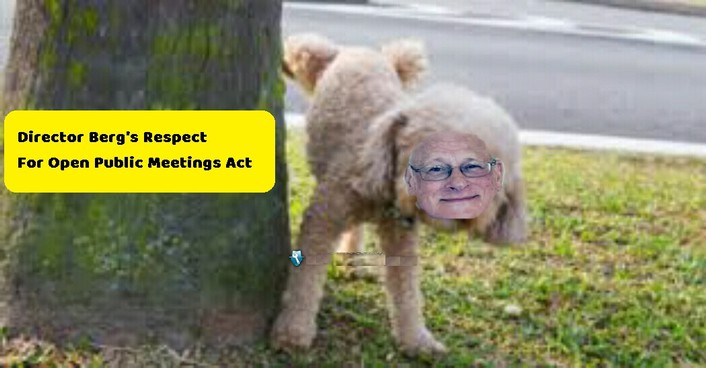SKSD & The OPMA - Citizens Supporting South Kitsap School District
Main menu:
SKSD & The OPMA
A QUICK REFRESHER OF THE OPEN PUBLIC MEETING ACT
WHAT IT ALLOWS, DOESN'T ALLOW, AND WHAT IT REQUIRES

The Public Meetings Act Deserves Respect!
F. Right to Speak at Meetings
The OPMA does not require a governing body to allow public comment at a public meeting. If a governing body does allow public comment, it has authority to limit the time of speakers to a uniform amount (such as three minutes) and the topics speakers may address. (The Open Public Meetings act OPMA does not allow those holding the meeting school board meetings in this case) control topics that a speaker may address. The school board cannot limit any speakers to any topics. SKSD Board only allows us 2 minutes)
3.5E. Attendance at Meetings
The OPMA provides that any member of the public may attend the meetings of the governing body of a public agency. The agency may not require people to sign in, complete questionnaires, or establish other conditions to attendance. RCW 42.30.040.
For instance, an agency could not limit attendance to those persons subject to its jurisdiction. The OPMA does not address whether an agency is required to hold its meeting at a location that would permit every person to attend. However, it seems clear that the courts would discourage any attempt to deliberately schedule a meeting at a location that was too small to permit full attendance or that was locked. RCW 42.30.050.
A person may record (audio or video) a meeting provided that it does not disrupt the meeting. 1998 Att’y Gen. Op. No. 15. A stationary audio or video recording device would not normally disrupt a meeting.
If those in attendance are disruptive and make further conduct of the meeting unfeasible, those creating the disruption may be removed.
RCW 42.30.050; In re Recall of Kast (2001). If order cannot be restored to the meeting by the removal of persons disrupting the meeting, the meeting room may be cleared and the meeting continued, or the meeting may be reconvened in another location. However, members of the media are entitled to attend the adjourned meeting and the governing body is limited to act only on those matters on the agenda. The governing body may also authorize readmitting persons not responsible for disrupting the meeting. Id.
Case in point: Our school board stopped a meeting when a visitor was not wearing a mask in accordance with Governor Inslee mandates on public meetings attendance. Note the board did not reconvene, they just left which in itself was a clear violation of the Open Public Meetings Act.
3.5 OPMA Meeting Procedures
A. “Action,” “Final Action” and “Meeting”
In its definition section, the OPMA first defines “action” before defining a “meeting” as a meeting “at which action is taken.” RCW 42.30.020(4). “Action” is defined to mean “the transaction of the official business of a public agency by a governing body including but not limited to receipt of public testimony, deliberations, discussions, considerations, reviews, evaluations, and final actions.” RCW 42.30.020(3). “Final action” is defined as “a collective positive or negative decision, or an actual vote by a majority of the members of a governing body when sitting as a body or entity, upon a motion, proposal, resolution, order, or ordinance.” Id. It is not necessary for a governing body to take “final action” for there to be a “meeting” that is subject to the requirements of the OPMA; mere “action,” such as a discussion of agency business, is sufficient. However, it is not "action" for members of a governing body to individually review material in advance of a meeting at which a public contract was awarded. Equitable Shipyards, Inc. v. State (1980).
Case in Point: SKSD Board of Directors is in violation of the Open Public Meetings Act in that speaking at a meeting is in fact attendance, yet our school board as prompted by Director Berg has added a condition of attendance by requiring/allowing only those who wish to speak to be a "Stake Holder", meaning you own property in school district boundaries, have family that work in the district or children that attend schools in the district.
Not Your Normal Rice Purity Test | SKSD & The OPMA | Awards Corner | The Ink Stained Wretch | Berg's Multiple Disorders | The Cowboy Parlimintarian | Genuine Psychological Concerns | "Discipline" Director Berg Style | A Letter To Director Berg | The Many Faces Of JR Berg | Pubilc Disclosure Complaints | Legal Claims Against Board Directors | Appeal Of Board Director's Decisions | Home Page | General Site Map
